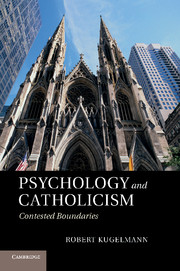Book contents
- Frontmatter
- Contents
- Acknowledgments
- 1 An introduction
- 2 The major fault line: modernism and psychology
- 3 Neoscholastic psychology
- 4 Psychology as the boundary: Catholicism, spiritualism, and science
- 5 Psychoanalysis versus the power of will
- 6 From out of the depths: Carl Jung's challenges and Catholic replies
- 7 Institutionalizing the relationship
- 8 Humanistic psychology and Catholicism: dialogue and confrontation
- 9 Trading zones between psychology and Catholicism
- 10 Crossings
- References
- Index
5 - Psychoanalysis versus the power of will
Published online by Cambridge University Press: 05 July 2011
- Frontmatter
- Contents
- Acknowledgments
- 1 An introduction
- 2 The major fault line: modernism and psychology
- 3 Neoscholastic psychology
- 4 Psychology as the boundary: Catholicism, spiritualism, and science
- 5 Psychoanalysis versus the power of will
- 6 From out of the depths: Carl Jung's challenges and Catholic replies
- 7 Institutionalizing the relationship
- 8 Humanistic psychology and Catholicism: dialogue and confrontation
- 9 Trading zones between psychology and Catholicism
- 10 Crossings
- References
- Index
Summary
The primary Catholic objection to the New Psychology in the early years was its submitting the human mind to the experimental laboratory. Did the very existence of an experimental psychology presuppose a “psychology without a soul” and thus suffer from a fatal flaw at the very moment of its birth? While this question was the topic of much debate in the early years of the twentieth century, the participation of noted Catholic thinkers significantly decided the issue. Mercier, Pace, and Moore, taking up the letter and spirit of Pope Leo XIII's 1879 encyclical, Aeterni Patris, sought to demonstrate theoretically and experimentally that a scientific psychology has its proper grounding in Scholastic philosophy and that, indeed, Scholastic philosophy benefits from the precise findings of an experimental psychology. Mercier argued that Scholastic thinking more adequately provides the theoretical and anthropological basis of experimental psychology than did its competitors, Cartesianism, Kantianism, and phenomenalism.
Experimental studies, however, remained remote to the burning issues of the Church. The challenges posed by psychophysics and the minute examination of sensation, perception, and memory had primarily theoretical implications. Not so for those offered by the scientific treatment of troubled mental life. In the middle of Catholic controversies over the meaning of psychotherapy stood Sigmund Freud and psychoanalysis – for here was a theory and therapy of the soul, one that challenged the authority and rationality of religious approaches to the cure of souls.
- Type
- Chapter
- Information
- Psychology and CatholicismContested Boundaries, pp. 165 - 202Publisher: Cambridge University PressPrint publication year: 2011



